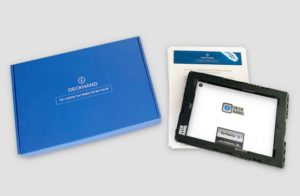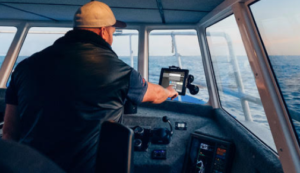I believe all fishermen deserve well-designed, powerful, and affordable technology to help them succeed in their businesses.
As a third-generation, financially-leveraged captain, my passion for putting useful tools in the hands of fishermen is driven by my own experiences operating in what never ceases to be a dynamic and unpredictable industry. I must accept, on a daily basis, that everything from market conditions to weather, biomass to breakdowns, climate change implications to fish politics and everything in between, is hanging in the balance. With that said, innovating to make fishermen’s lives easier, more profitable, sustainable, and dare I say – predictable – is important work. I believe that the best tools to help us succeed in changing environments are still forthcoming.

A decade ago, Real Time Data’s Deckhand electronic logbook concept originated from a need to solve paperwork-intensive landings in South Australia. By mid-2019, Deckhand deployed across more than thirty gear types in New Zealand. Deckhand’s unique user interface, built with comprehensive input from fishermen, is designed for fat-fingering in rolling wheelhouses. The underlying software engine — doing the heavy lifting for fishers behind the scenes — is extremely powerful. Furthermore, Deckhand is affordable.
When not fishing, I manage Real Time Data North America’s operations for the US and Canada. The serendipitous opportunity to begin work with a startup company building ER software came in late-2017, and I haven’t looked back since. Like departing a safe anchorage for the fishing grounds, feelings of uncertainty and exhilaration abound as we work to launch Deckhand in the US market.
We are currently bolstering the software for broader, more seamless scalability while ground-truthing market perceptions with fishermen as we work to make Deckhand available to anyone who wants to try it. Needless to say, we’re learning a lot in the process.
First, it is clear that ER is only one small cog in the complex wheel of electronics-based compliance, accountability, and traceability in fisheries. While this is important to acknowledge, innovators mustn’t stumble because of it. Hopefully, we do what we do because it makes us tick and we do it well. I believe the Deckhand logbook can be one of many tools in a world full of brilliant solutions for commercial fishermen in EM, ER, and elsewhere. Ultimately, end-users will decide which solutions work best, while tech innovators keep rolling out products and building on their proficiencies.

Secondly, fishermen must dictate what drives the look, feel, and utility of the products they’re going to use in their everyday lives. As builders and designers, we can take care of the rest of it. For example, part of what makes Deckhand unique is a new workflow engine we’ve built called Catchflow™. We’re really excited about it and strides are made every day in its development. However, we often have to stop ourselves and remember that not everything we build into the software is outwardly visible to fishermen. At a basic level, the women and men who use our product simply want it to do what it’s supposed to while clearly exhibiting value and practicality to the vessel’s operation. Building software and hardware for commercial fishermen is about commercial fishing, not our own love for our technology. Based on experience, I think it’s sometimes easy to lose sight of this.
We are learning as we go and making course corrections every day. It is inspiring and enlightening to watch the industry rally around emerging technologies that will shape the future sustainability, efficiency, and profitability of fisheries. Any tool that decreases unpredictability, increases awareness, and makes the fishing life easier is a good tool. Our best days, as an industry, are ahead.
We encourage fishermen and other industry stakeholders to engage with us to discuss ideas, problems, and solutions. Since January we have been in a new office space on the waterfront in Bellingham, Washington, and the coffee is always on for visitors. For more information about Deckhand and Real Time Data, visit www.deckhandlogbook.com or find us on Instagram, Twitter, and Facebook @deckhandlogbook.

